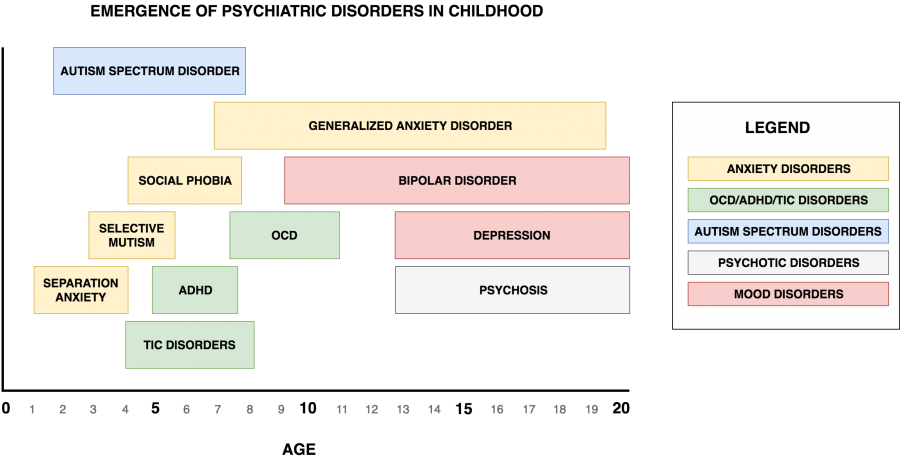- Last edited on October 19, 2020
Child and Adolescent Psychiatry Interview
Primer
The Child and Adolescent Psychiatry Interview is a specialized psychiatric interview tailored to children and adolescents. It requires a particular focus on psychosocial factors.
Timeline of Childhood Disorders
When doing a child and adolescent assessment, it is very important to keep in mind the age of the child, and the likelihood disorders occurring at that particular age.
Patient ID
- Age
- Home/Living with
- Grade/School
- Part time jobs
- Religious affiliation
History of Presenting Illness (HPI)
Depression
- Depression
- Don't forget to ask about irritability, which is common in children and adolescents
- When asking about appetite and weight, also ask about body image and intentional weight loss to screen for eating disorders
Anxiety and Panic
Anxiety symptoms and disorders are common in children, and are often part of the normal neurodevelopmental history.
Psychosis
Mania
Childhood bipolar disorder is overdiagnosed.
OCD
OCD can present commonly in childhood.
ADHD
Oppositional Defiant Disorder
- Loses temper
- Argues with adults
- Defies or refuses
- Deliberately annoys
- Blames others
- Touchy or easily annoyed
- Angry and resentful
- Spiteful
Eating Disorders
It is important to screen for eating disorders in children and adolescents, as there high prevalence and high mortality with eating disorders.
Safety
- Suicide/homicide
- Cutting and self-harm
- Trauma or abuse from adults at home/school/other
Social History
In the social history, you need to get an understanding of the child's relationship with their family, school, friends, extracurricular activities, and any ongoing stressors.
School
- Grades
- Favourite Subject
- Homework
- Teachers
- Does the child have any Individualized Education Plans?
- Have they had a psychoeducational assessment? When? By whom?
- Report card comments?
Social
- Bullying?
- Friends
- Social Media
- Relationships (Sexual/Romantic)
Home
- Who are the family members present?
- Siblings
- Parents
- Are conflicts common?
- What are the family dynamics at home?
Self
- Ask about feelings
- “What are the main feelings you usually feel?” (happy, sad, angry, anxious, irritable)
- Feelings → (lead to) Behaviours
- “What do you do when you have these feelings?” (self-harm, externalized behaviours (e.g. - acting out, truancy, disruptive), internalized behaviours (e.g. - rumination)
- What are your strengths? (Can ask both the parents or the child)
Legal History
- Truancy
- Skipping school
Neurodevelopmental History
- Age of parents at conception
- Illnesses in pregnancy
- Substance use during pregnancy
- Toxin exposure
- Birth term
- Delivery complications
- Growth charts
- Developmental Milestones
- What is the child/adolescent’s strengths?
Medical
- History of seizures, recurrent infections, easy bruising/blood clots, tumours/growth, muscle pains/arthritis, or any other diagnosed medical conditions
- Hearing, vision, or cardiac problems
Pubertal History
- Age of menarche
- Regular/irregular menstrual cycles
Family History
- Psychiatric (bipolar disorder, schizophrenia, completed suicide/suicide attempt)
- Seizures/epilepsy
- Birth defects
- Infertility
- Known genetic conditions
- Sudden Unexplained Deaths (SIDS?)
- Congenital Cardiac Malformations?
